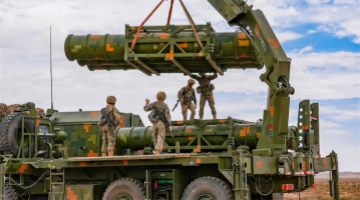By Li Zixin
The White House recently released a statement saying that US President Biden had reaffirmed America's security commitment to Israel in a recent phone conversation with Israeli Prime Minister Netanyahu, vowing to help it cope with all threats from Iran and prevent it from a possible regional war resulting from the assassination of Hamas top leader Ismail Haniyeh. At the same time, US Defense Secretary Austin ordered a re-deployment of American troops to dispatch more maritime forces to the Middle East and Europe and a fighter squadron to the former to enhance its air defense support capability.
While the tension in the Middle East is displaying more obvious overspill effects, America's deployment of more forces to the region will in no way help with its peace process, but will further aggravate the tension and increase the risk of escalation.
For a long time, the US has not only continuously increased its support for Israel to maintain its military superiority in the region, but also turned a blind eye to Israel's series of actions in violation of the UN Security Council's resolutions and the country's obligations under international law. According to statistics from the Chicago Council on Global Affairs, by the end of 2023, 45 of the 89 draft resolutions that the US had vetoed at the Security Council were about Israel, including 33 concerning Israel's occupation of Palestinian territory or its treatment of the Palestinians. Some American scholars said Israel is getting increasingly unscrupulous and radical in its domestic politics and treatment of Palestinians exactly because the US has been giving it unconditional support in the past decades.
Since the latest round of Israeli-Palestinian conflict broke out on October 7 last year, Israel's military operations in the Gaza Strip have caused a colossal amount of casualties, seriously damaging the local infrastructure and exacerbating the humanitarian crisis there.
But America has tasted the bitter fruit of its blind inclination toward Israel, and its dominance in their bilateral alliance has become precarious. Recently, although the Biden administration clearly expressed its hope for Israel to bridge divergences and ink a ceasefire deal in Gaza as soon as possible, Israel has gone its own way and, after Netanyahu came back from its US trip, escalated the military attacks on Hezbollah and Hamas. It even vowed to keep expanding the scope of attacks.
Not only is the US unable to control Israel's military adventurism, but it has to keep providing it with weapons and troops and escorting its ships in the Red Sea… Such squandering of money and manpower has drawn a lot of complaints from the American public. Not long ago, thousands of people protested near Capitol Hill against Netanyahu's visit and dozens of US congressmen also boycotted Netanyahu's speech in the US Congress.
Given the grave situation in the Middle East today, the concerned parties should mind the international call for a ceasefire, comprehensively execute the Security Council's resolution, and cooperate in the international mediation efforts, taking practical and effective steps to relieve the heat and restore peace and stability in the region. History has taught us over and over that military means and abuse of force are never the right way out. America's self-opinionated deployment of more troops to the Middle East will only pour fuel on the flames and court a bigger crisis.
(The author is from the China Institute of International Studies.)









